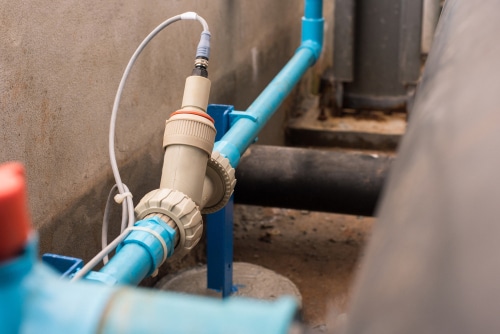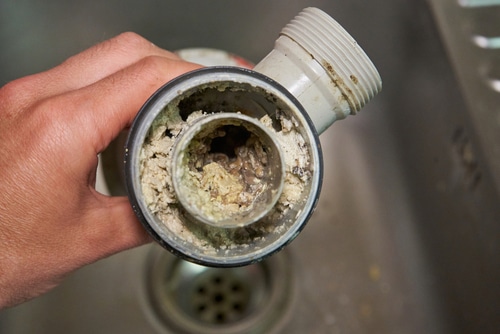
Filtered water is considered the safest and healthiest drinkable option when living in an urban environment.
By removing impurities such as bacteria and microorganisms, the water is optimal for drinking and cooking as well as other uses, while ensuring your overall health and well-being.
Achieving safe and healthy filtered water for safe and enjoyable consumption can be done by using the right filters. You won’t need to worry about unpleasant contaminants being present in your drinking or cooking water which could otherwise cause adverse effects on your health!
If you’ve noticed that your filtered water smells a bit fishy at times, there are a number of reasons for this happening. Keep reading to find out what they are and what you can do to eliminate the fishy smell.
Why Does My Filtered Water Smell Like Fish?
Drinking clean water shouldn’t have much of a smell to it but sometimes it can end up having unwanted or unpleasant odors that closely resemble fish! The main culprit is often the source of your filtered water or the filters themselves.
Here are some reasons why your filtered water could be smelling less than ideal!
- The Wrong Levels of Chlorine
Chlorine is normally added to large reservoirs to disinfect and get rid of impurities. It’s used to reduce the growth of algae and other microorganisms. In most instances, chlorine doesn’t make filtered water smell especially if used in the right quantities.
Chloramine, a compound made up of a combination of chlorine and ammonia is often used to disinfect public water supplies. However, it normally results in a foul or fishy smell. Odd smells can be caused by organic materials that naturally occur in the water.
Another reason why your water supply could be smelling similar to fish is the growth of algae blooms in lakes and reservoirs where it comes from. This often happens in the hotter, summer months.
If you’re treating your filtered water with chlorine, it’s important to use the right levels to avoid odd or off-putting odors. Otherwise, report the fishy odor to your local water supply so they can inspect and rectify the problem.

Some filters used to clean water use chlorine and you’ll need to check them to ensure the levels are optimal for getting rid of unpleasant smells in your drinking water.
- Barium and Cadmium Metals
Cadmium and Barium metals are often found in well reservoirs, resulting in bad-smelling water. Barium metal comes from mineral ore while Cadmium is found in industrial waste and fertilizers.
Organizations such as the EPA constantly monitor water sources for these metals to ensure they’re well below the recommended level for safe human consumption.
If you’re using your own private well reservoir for drinking water and suspect contamination because of bad smells, it’s advisable to have it tested for these metals.
- Clogging of Water Pipes
Other reasons your filtered water could be smelling unpleasant are the channels or pipes through which your supply comes. Clogging caused by algae build-up, debris, or other impurities will result in fish-smelling water when you open the taps in your home.

Over time, water pipes tend to have an accumulation of microorganisms and other dirt. While maintenance of the pipes can reduce this from happening it’s not always possible to prevent clogging on some occasions.
If present in the water source, Barium and Cadmium metals can seep into the pipe lining, resulting in a fishy or odd odor. Manual inspections of the water will identify if these metals are contaminating the source running through the pipes.
Using the right levels of chlorine in filtered water moving through pipes should reduce the build-up of impurities and microorganisms in the piping system. However, if the pipes belong to a public water company, there’s not much you can do about keeping them clean!
- Using the Wrong Drinking Water Filters
If you’re using drinking water filters to clean tap water, using the right ones is vital to eliminate any chances of your supply smelling off.
The best type of water filter for removing chlorine, agricultural chemicals, sediment, and organic substances that could result in a fishy odor is activated carbon. This works by binding impurities in the water to the char, a porous material of activated charcoal or carbon.

Activated carbon filtration systems are commonly used in homes and offices for safe drinking water. If you’re using the wrong filters, you could end up with clean and drinkable water that smells foul.
Before installing a drinking water filtration system in your home or workplace, ensure it will remove the culprits responsible for fishy or other foul odors.
- Dirty Water Air Filters
While not really used to clean drinking water, dirty HVAC filters can cause a fishy smell in your home or office. These filters target pollutants and other irritants, improving ventilation and helping you to breathe better when indoors.
Cleaning HVAC filters regularly and replacing them from time to time will help keep your indoor air fresh-smelling. A regular maintenance schedule is vital for optimal ventilation when using your HVAC.
If you notice an offensive smell when your HVAC is running, dirty filters could be the reason.

Calling your HVAC guy or the company from whom you’re hiring your HVAC system will help solve the problem. By cleaning or installing new filters, you can be sure unpleasant smells will be eliminated!
Is the Fishy Smell Safe and When Should You Be Worried?
If the smell is due to algae growth or chlorine, and it isn’t too pungent, it should be safe for you to consume the water. Algae blooming in the summertime could affect your local water supply and be responsible for foul smells.
In this instance, drinking water is normally safe to ingest. However, if the smell gets unbearable and it doesn’t seem to go away, it’s advisable to call in your local water supplier for an inspection.
They’ll run some tests to diagnose the real problem and fix it while sharing some preventative tips with you should the issue be from your side.
What Can You Do?

If you’re reliant on a local supplier for your drinking water, there’s not much you can do besides reporting bad odors when they get overpowering.
When using your own source of water from a well, it’s important to use the right levels of chlorine to eliminate algae growth and other impurities that could result in foul smells.
Always make sure your drinking water filters are designed to remove the culprits responsible for fishy smells and ensure the water-related unit is regularly serviced.
Flushing your water pipes to remove removing the build-up of debris and other contaminants in the piping lining could help to reduce unpleasant odors. Calling a specialist will help to track down the problem if none of these fixes solve the issue.
Final Thoughts

Every now and then, your filtered water could start smelling fishy and while it’s unpleasant it’s not normally a cause for concern.
However, if the bad odor persists beyond a few days, it’s sometimes a sign that something is wrong with the water. Based on the source of your water supply, you can use one of our fixes mentioned in this article to solve the problem!
